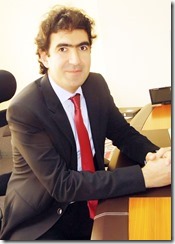IHS has been one of the leading independent tower companies in Africa, and the September 2014 move of over 9,000 sites from MTN Nigeria to a company jointly held by IHS and MTN took the company to a whole new level of operation. Mohamad Darwish, IHS Group Executive Committee Member and founding partner, has a hands-on roll in Nigeria as IHS’ deputy CEO there, and talks to Comm. about the opportunities and challenges resulting from the company’s successes across the continent
Darwish says IHS didn’t only come about with co-location solutions, but has long technical experience and expertise in telecom
Mohamad Darwish estimates that the deal with MTN Nigeria alone will result in IHS’ staff compliment in the country rising from 600 to at least 1,000 given the scope of the work required. He believes the intrinsic benefits that independent tower companies such as IHS bring to bear continue to centre on the creation of efficiencies, sharing of resources, and ultimately the reduction of costs.
“We are actively driving down costs, and as a neutral partner to network operators, can be considered as a solid technical partner,” Darwish says. “In IHS’ case in particular, we find that the companies we work with are comfortable with our abilities as a partner, and see us as a way to reduce cost, and raise some cash.”
The model for tower companies, at its most basic, is the offer of cash now for the passive infrastructure and real estate sites of network operators that they then lease back, and which companies such as IHS then go on to make money from by offering co-located services to multiple service providers. It is a concept that appears to be garnering significant support from the investor community with IHS having been able to raise US$1.6 billion in the year to April 2014 alone.
Darwish, who is the brother of IHS Group CEO, Issam Darwish, says the company’s two main offerings encompass the reduction of costs to network operators while allowing them to raise cash from selling their base of towers; as well as offering a better quality of service measured by the 99.9 per cent network availability in up-time.
“IHS has a long history of working with network operators, spanning 15 years,” Darwish explains. “We didn’t only come about with co-location solutions, but we have long technical experience and expertise in telecom.”
Indeed, IHS’ perceived expertise is being converted into significant momentum by the company which last November announced that it had signed agreements for a capital raise of US$2.6 billion, comprising equity of US$2 billion and a loan facility of US$600 million. At the time the company said the deal represented the largest equity raise in Africa since 2007 and served to underline its position as the largest tower company in Europe, Middle East, and Africa.
That latest tranche of fundraising lifted IHS’ total amount raised to US$4.5 billion since 2012, with the company stating it has deployed the funds in establishing market-leading positions across Africa in Nigeria, Cameroon, the Ivory Coast, Zambia, and Rwanda.
The round of funding announced in November is set to be applied to acquisitions that have more than doubled the size of the company’s tower portfolio in the 12 months to that point, as well as further new site build programmes across the IHS footprint. 
Nigeria is Africa’s largest cellular market with nearly 200 million active lines. Stiff competition amongst network operators has made the independent tower operator proposition more appealing
The funds are also earmarked for the continued roll out of innovative, efficient power technologies and operational management solutions including solar systems and high efficiency generator units, which are set to deliver greener and more efficient power systems to IHS’ tower portfolio.
“In parts of Africa around half of operators’ opex is spent of powering base stations with diesel. We are serious about exploring and implementing alternative power solutions, and in Nigeria alone 3,000 sites are already powered by new power systems,” Darwish says.
With a view to replicating its success in Africa in other emerging markets in other parts of the world, a recent tie-up with India operator Bharti Airtel may be a stepping stone to South Asia and beyond for IHS, though the agreement it announced with the India telco in December 2014 is still very firmly based on the continent of Africa. With that agreement came an additional 1,100 towers in Zambia and Rwanda moved over to IHS through a sale and lease back arrangement under a 10-year renewable contract with Bharti Airtel, resulting in the expansion of the IHS’ Africa tower footprint to over 21,000 towers across five countries.
“We are following the growth and development of the mobile operators and are extremely optimistic about the future. In Nigeria specifically, which is something of a high level reference market for us, we are ready for the implementation of 3.9G,” Darwish concludes. “There is plenty of work that is required, as it’s a complex business we are running, with there being three and sometimes even four tenants sharing tower sites. We are also busy rolling out into new geographic areas and ensuring the integration of new sites, and new power solutions.”





0 comments ↓
There are no comments yet...Kick things off by filling out the form below.
Leave a Comment